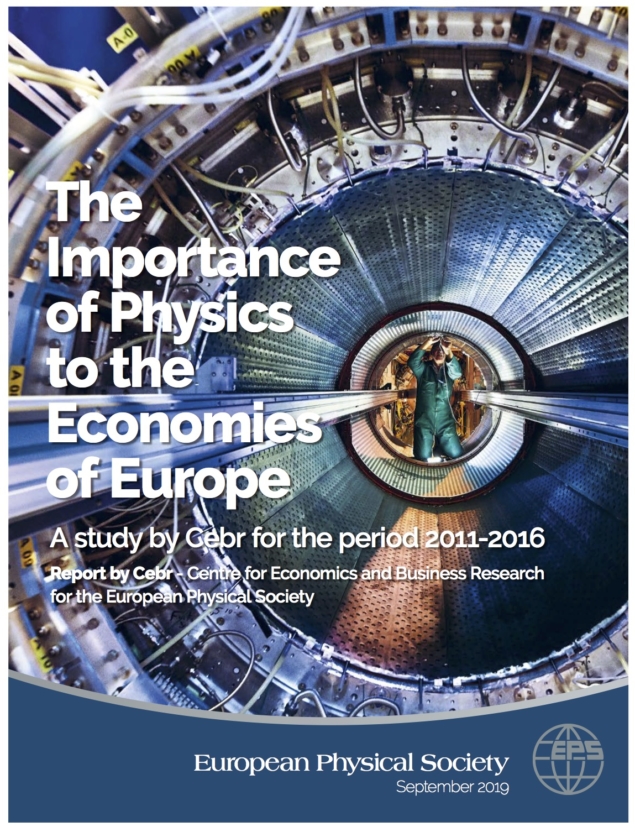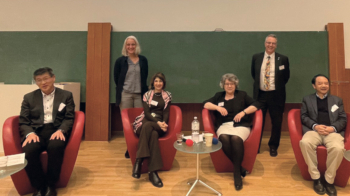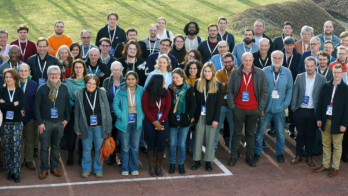
Physics-based industries generate over 16% of total turnover and more than 12% of overall employment in Europe, topping contributions from the financial services and retail sectors, according to a report published by the European Physical Society (EPS). The analysis, carried out by UK consultancy firm Cebr (Centre for Economics and Business Research), reveals that physics makes a net contribution to the European economy of at least €1.45 trillion per year, and suggests that physics-based sectors are more resilient than the wider economy.
“To give some context to these numbers, the turnover per person employed in the physics-based sector substantially outperforms the construction and retail sectors, and physics-based labour productivity (expressed as gross value added per employee) was significantly higher than in many other broad industrial and business sectors, including manufacturing,” stated EPS president Petra Rudolf of the University of Groningen. “Our hope is that the message conveyed by the EPS through the study performed by Cebr will be inspiring for the future, both at the European and national levels, making a convincing case for the support for physics in all of its facets, from education to research, to business and industry.”
The Cebr analysis examined public-domain data in 31 European countries for the six-year period 2011-2016. It defined physics-based industries as those where workers with some training in physics would be expected to be employed and where the activities rely heavily on the theories and results of physics to achieve their commercial goals, following the statistical classification of economic activities in the European community (NACE).
Germany showed the highest percentage of turnover from physics-based industries
Based on several different measures of economic growth and prosperity, the analysis found that physics-based goods and services contributed and average of 44% of all exports from the 28 European Union countries during the relevant period. The three major contributions were from manufacturing (42.5%), information & communication (14.1%), followed by professional, scientific & technical activities in physics-based fields such as architecture, engineering and R&D (14.1%). Distributions in employment data were found to be broadly similar, with professional, scientific & technical activities showing the strongest employment growth. Germany showed by far the highest percentage of turnover from physics-based industries (29%), followed by the UK (14.2%), France (12.9%) and Italy 10.4(%).
Taking into account “multiplier impacts” that capture the knock-on effect of goods and services on the wider economy, the analysis found that for every €1 of physics-based output, a total of €2.49 output is generated throughout the EU economy. The employment multiplier is higher still, meaning that for every job in physics-based industries, an average of 3.34 jobs are supported in the economy as a whole by these industries.
The report also found the European physics-based sector to be highly R&D intensive, with expenditure exceeding €22 billion in every year. “However, what seems to be difficult to comprehend for policy makers and for the general public that elects them is that keeping the physics-based sector in the economy strong and addressing global societal challenges is a process of a very long-term nature,” comments Rudolf. “Indeed, it will not suffice to develop technologies on the basis of the current knowledge: new paths and new knowledge will be needed, which can only be generated by open-ended research.”
While the report does not assess the impact of different sub-fields of physics, it is clear that high-energy physics is a major contributor, says former EPS president Rüdiger Voss of CERN. “The sheer scale and technological complexity of big-science projects, and the thousands of highly-skilled people that they produce, makes particle physics, astronomy and other research based on large-scale facilities significant contributors to the European economy – not to mention the fact that these are the subjects that often draw young people into science in the first place.”





